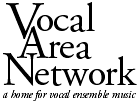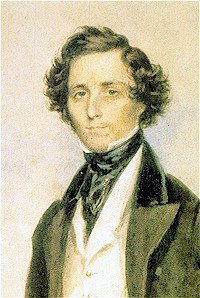 |
 |
Advertise | Sustaining Membership | VAN Store | Feedback
by John Maclay for Vocal Area Network
Posted April 28, 2006
 Two
great stars are about to be in alignment for New York's choral
aficionados, with both of Felix Mendelssohn's oratorios being offered in the
space of a single week. On Thursday, May 4 at 8:00 PM, the superb Choir and
Orchestra of Saint Ignatius Loyola will present Paulus, Op. 36, under the
direction of Kent Tritle. On Friday, May 12 at 8:00 PM, John Maclay will direct
the Choral Society and Orchestra of Grace Church in New York in a performance of
Elijah, Op. 70. This rare opportunity to hear, in such close proximity,
live performances of two masterworks seldom touched by New York's mainline
performing arts institutions is not to be missed!
Two
great stars are about to be in alignment for New York's choral
aficionados, with both of Felix Mendelssohn's oratorios being offered in the
space of a single week. On Thursday, May 4 at 8:00 PM, the superb Choir and
Orchestra of Saint Ignatius Loyola will present Paulus, Op. 36, under the
direction of Kent Tritle. On Friday, May 12 at 8:00 PM, John Maclay will direct
the Choral Society and Orchestra of Grace Church in New York in a performance of
Elijah, Op. 70. This rare opportunity to hear, in such close proximity,
live performances of two masterworks seldom touched by New York's mainline
performing arts institutions is not to be missed!
Paulus tells the story of Saul of Tarsus, his conversion on the road to Damascus, and, as Paul, his subsequent missionary work in the early Christian church. In structure and musical language, the work bears the imprint of J.S. Bach, whose St. Matthew Passion Mendelssohn had famously revived just a few years earlier. With Paulus, Mendelssohn demonstrated complete mastery of all the major devices of the Passions, including the chorale, the turba or crowd chorus, and an Evangelist-style advancement of the narrative, while managing to convey at the same time his own deeply personal connection to the tale. There are those who have even seen the work as an allegory for the Mendelssohn family's own conversion to Lutheranism.
At the 1836 Festival of the Lower Rhine, just taken over by Mendelssohn, Paulus was the star attraction. The premiere, in Dusseldorf, almost 170 years to the day before next week's performance on the Upper East Side, employed 364 volunteer singers and 172 players, and vaulted Felix into the front rank of German composers. International recognition swiftly followed, including performances in New York, Baltimore and Boston between 1837 and 1839. Astonishingly, the New York Philharmonic premiere of Paulus did not take place until 2000, with a visibly moved Kurt Masur on the podium.
For the 27-year-old Mendelssohn, Paulus represented a summing-up of the major influences in his young life. With Elijah, he was to reach the summit of his compositional powers. A decade of superstardom had not dulled Felix's intellectual growth. He had become preoccupied with creating a large-scale dramatic work that would express his own authentic musical voice, and in the quarrelsome Old Testament prophet, he found his muse. Mendelssohn conceived of the main character as "a real prophet through and through, of the kind we could really do with today: Strong, zealous and, yes, even bad-tempered, angry and brooding … indeed in contrast to almost the whole world -- and yet borne aloft as if on angels' wings." The prophet's outer and inner journeys are conveyed with a propulsive energy so often lacking in the oratorio form, without sacrificing a shred of the required dignity.
Elijah had its premiere in August 1846 at the Birmingham Choral Festival -- the same year, incidentally, that New York's Grace Church was built. A devoted force of 271 volunteer choristers and 125 players, many of whom had come up with the composer on a special train from London, wedged into Town Hall with 2,000 listeners for one of the most eagerly anticipated -- and rapturously received -- musical events of all time. Fresh from the performance, Felix took a walk with some friends along the nearby industrial canal. There, among the slag-heaps, he hit upon the idea to transform "Lift Thine Eyes" into the magical a cappella angel-chorus we know today. Elijah was spontaneously and universally hailed as the greatest oratorio after Messiah.
Mendelssohn grasped the potential for music -- and choral singing in particular -- to unify and inspire the community. He would have agreed wholeheartedly with Robert Shaw's view that choral performances had the potential to be "great occasions of state." Written for volunteers, drawing on the richest of musical traditions, and designed with the public in mind, Felix's oratorios are best experienced communally, in the realm of live performance. In Paulus (May 4), with its stirring evocation of the spirit of Bach, and Elijah (May 12), with its dramatic immediacy, the New York musical scene has cause to celebrate.
Performance details:
Paulus: Thursday, May 4 at 8:00 PM, Choir and Orchestra of St. Ignatius Loyola, 980 Park Avenue at 84th Street. Admission: $25-$45. Pre-concert lecture at 7:00 PM. The New York Theatre Wire calls Kent Tritle's Sacred Music in a Sacred Space "one of the highlights of the Manhattan musical season."
Elijah: Friday, May 12 at 8:00 PM, Choral Society and Orchestra of Grace Church, Broadway at East Tenth Street. Admission: $15 in advance, $20 at the door. The New York Sun writes that, in a recent sampling of New York's large singing ensembles, "none has been even close to the level of professionalism of this strictly volunteer group."
John Maclay is the director of the Grace Church Choral Society.